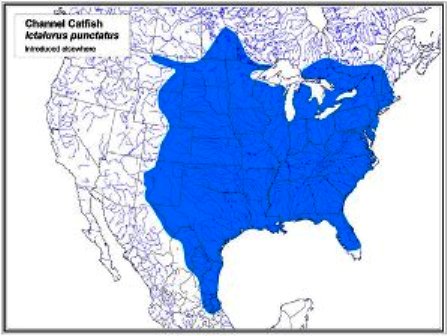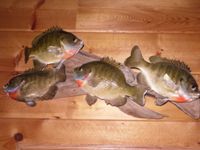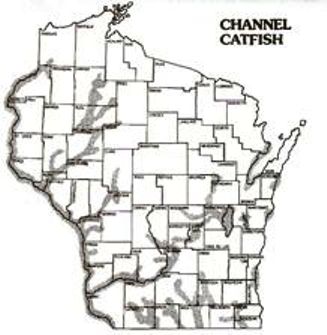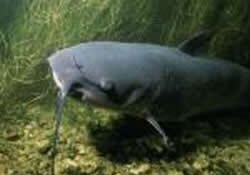Where Do Cat's Call Home?
 Channel catfish inhibit an array of different
habitats. The picture to the right outlines where in the
United States channel catfish have been found. This map shows
the extent of climates channel catfish can tolerate; they can
survive climates ranging from the harsh winters of Canada and the
northern United States to the warm summers of southern United States
and Mexico. Most commonly, they can be found in clear water
with a medium to rapid flow. However, they can easily adapt to
living in murky or slowly flowing waters also.
Channel catfish inhibit an array of different
habitats. The picture to the right outlines where in the
United States channel catfish have been found. This map shows
the extent of climates channel catfish can tolerate; they can
survive climates ranging from the harsh winters of Canada and the
northern United States to the warm summers of southern United States
and Mexico. Most commonly, they can be found in clear water
with a medium to rapid flow. However, they can easily adapt to
living in murky or slowly flowing waters also.
Catfish prefer river bottoms lined with large
rocks, trees or concrete structures to hide under or lie beside.
The catfish remain mostly sedentary during the day and feed mostly
at night. More information about feeding can be seen in
Nutrition.
The areas of the Mississippi River where I have had the most luck
catching channel catfish are on sand flats with water 3 to 6 feet
deep and around brush piles or lock and dam markers.
The channel catfish have a wide distribution throughout Wisconsin. They can be found in many of the tributaries leading to the Mississippi River as well as in the eastern portion of the state near Green Bay and Lake Michigan. The reason for their wide distribution is their ability to adapt to murky waters and alternate food sources.
To the right is an image of a channel catfish on the bottom of a riverbed. Notice how the riverbed is rocky and has vegetation to provide covering for the catfish. Also, note the difference in color between this catfish and previous pictures. This is another example of the wide array of coloration in channel catfish.
Who Rooms With the Channel Cat?

The channel catfish are not the only
inhabitants of our regional waters, so who do they live with?
Two of the many species of fish that live alongside the channel
catfish are the
northern pike,
largemouth bass and
bluegill. Please feel free to visit the linked websites to
learn more about those species of fish!
To learn about what the channel catfish eats along with more interactions with other species, visit Nutrition!

